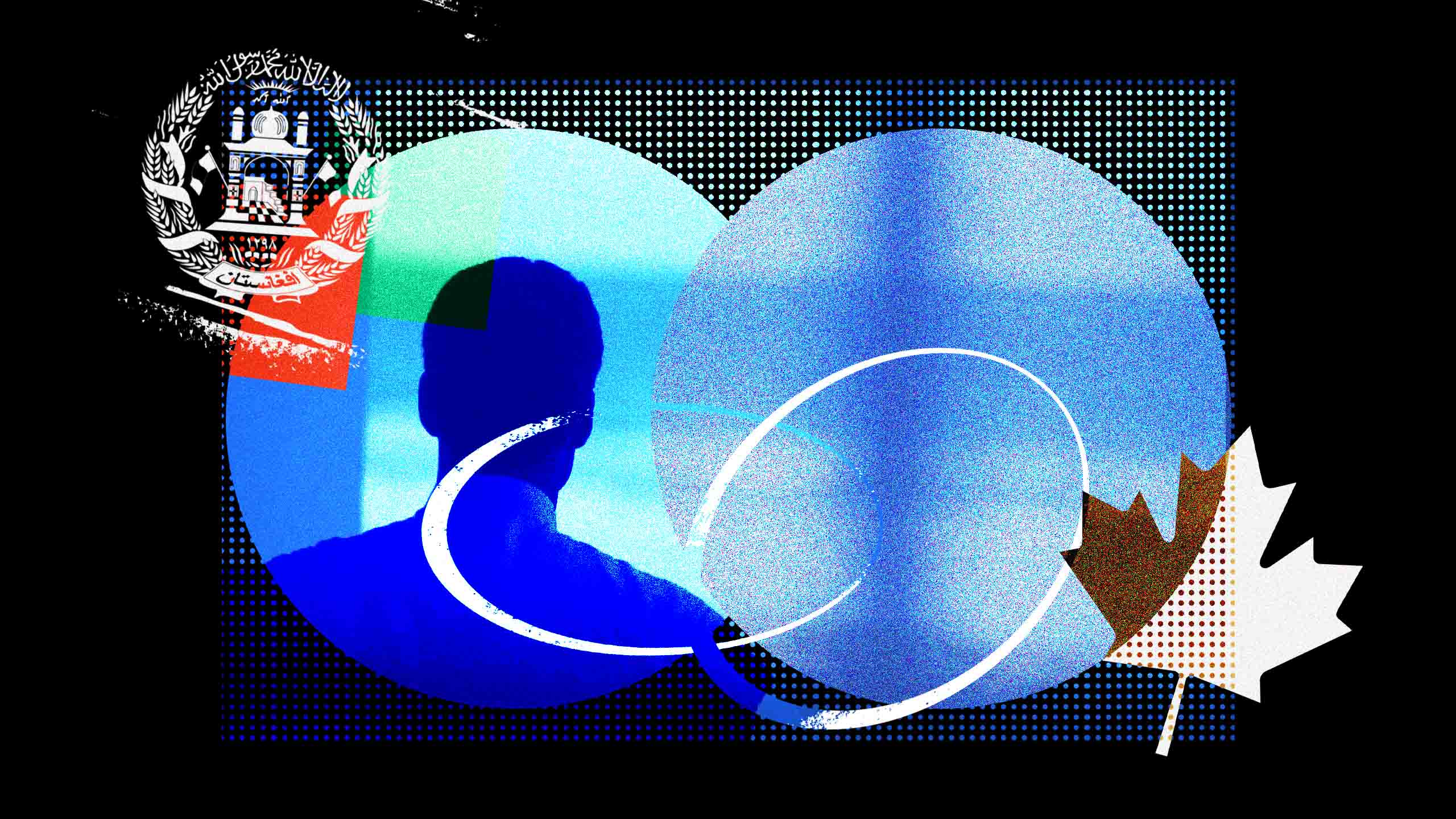Rezwan sat on a bus on his way to back to Kabul, carefully deleting anything on his phone— pictures, music, search history—that could indicate that he’s gay. He feared his belongings would be searched by the Taliban before he made it to the airport and anything incriminating could have been used as a reason for arrest.
“I was just like a body without a soul,” he recalls in an interview from his new home in Canada. For Rezwan’s security, Xtra is identifying him using a pseudonym and withholding some identifying details.
Before the Taliban took over Afghanistan in August 2021, it wasn’t safe for Rezwan to be openly gay, but he was able to live a quiet life as a student in Kabul with a tight-knit community of queer friends. Since the takeover, though, Rezwan and his friends have gone into hiding. With the Taliban in power, women, queer people and ethnic minorities were, and still are, facing a vicious crackdown, impacting their ability to access education, move freely around the country and live openly in their identities.
Canada has accepted LGBTQ+ Afghan refugees through a humanitarian refugee program launched after the Taliban’s takeover, which has helped over ten thousand people, but hundreds more are stuck in limbo, waiting to come to Canada. Organizations that assist LGBTQ+ refugees, like Immigration Equality and Rainbow Railroad, say the federal government needs to increase capacity and streamline the refugee process to ensure queer refugees make it to safer countries.
After the Taliban took the capital city of Kabul on August 15, 2021, Rezwan and a friend joined thousands of people camped out at Kabul International Airport who were desperate to evacuate via U.S. Army planes. They slept in front of the airport for days, but were never allowed inside.
Bridget Crawford, legal director at Immigration Equality, describes an “attempted mass exodus of LGBTQ+ people from Afghanistan,” but says that many found themselves trapped in the country. Much of the evacuation effort was aimed at Afghans who had assisted Western governments in a variety of roles, such as translators and civil servants, as well as their family members.The United States initially evacuated around 70,000 people, the majority of whom had worked with the government.
Crawford says that with the U.S. immigration system overwhelmed, and funding for refugee pathways gutted by the Trump administration, resources for Afghans who hadn’t worked with Western governments were limited.
“There wasn’t really an avenue that could quickly move LGBTQ+ people,” says Crawford.
With their options for evacuation dwindling, Rezwan and his friends went into hiding, growing their beards, wearing traditional Afghan clothing and hiding their faces with scarves when they had to leave home for essentials. Even then, Rezwan feared that a place that had once been a refuge could end up giving him away to the authorities: if the security cameras outside of his favourite club are seized by the Taliban, for example, those who had been captured on tape going into the club could be targeted.
“We had some rights in [the bar], and could be a little relaxed at that place, but after the Taliban takeover, those places are already closed,” says Rezwan.
When they went into hiding, Rezwan and his friends spent their days researching organizations that could help them get out of Afghanistan and to a second country where they could then register as refugees. Eventually, in October 2021, he received word from Aman Project, an organization assisting LGBTQ+ refugees in the Middle East and North Africa, that he and his friends were to take a flight to a neighbouring country.
Before evacuating, Rezwan visited his family to say goodbye. Though they aren’t aware he is queer, they supported his decision to leave the country. Since Rezwan and his family are Hazara, an ethnic group that has long endured violent oppression in the country, they agreed leaving Afghanistan would be best for him.
“Being at home was so hard for me. My mom and my family hugged me and told me, ‘There is no place for you, so you have to leave,’” says Rezwan.
After leaving Afghanistan, Rezwan faced another hurdle many Afghans fleeing their home country encounter: spending months in countries where it is also unsafe to be openly queer, waiting for immigration applications to be approved.
Crawford said that because of the homophobia Afghan refugees often encounter in the countries they go to after leaving Afghanistan, many are afraid to disclose their sexual orientation or gender identity to organizations catering to refugees.
“We find in particular, LGBTQ+ people who have a refugee claim based on SOGI status [sexual orientation and/or gender identity] are afraid in that third country to disclose it,” says Crawford. “So a lot of times, [they] are lost in the shuffle.”
Rezwan said the ten months he spent waiting for his immigration application to be approved felt endless. Though Rezwan was reunited with some of his friends in the transitional country, he worried for his family’s safety, hoping that they wouldn’t be targeted by the Taliban.
Almost a year later, Rezwan made it to Canada through a program that allowed Immigration Equality to refer Afghan refugees to Canada for speedier processing. Since then, several hundred LGBTQ+ people have been referred, with dozens having already landed in Canada. Crawford expects another dozen to arrive in the coming months.
But that referral program is now at capacity, closing yet another door for queer Afghans and limiting opportunities for people like Rezwan to evacuate. Immigration Equality and Rainbow Railroad are both pushing the government to increase capacity and partner directly with refugee organizations to make the process easier.
During a webinar reflecting on their work with Afghan refugees, Executive Director Kimahli Powell said Rainbow Railroad has helped resettle 247 queer Afghans over the past year. They have 300 LGBTQ+ Afghans awaiting assistance, with 25 in safe houses in countries like Pakistan and Turkey.
In May 2022, Rainbow Railroad launched Safe Way Out, a campaign to push the Canadian government for a direct partnership that would create more and quicker pathways for queer refugees.
Right now, the process to resettle LGBTQ+ Afghan refugees involves sending documents, like biometric data and vulnerability assessments, between the U.S. State Department, the Canadian government, advocacy organizations and U.N. departments.
Devon Matthews, director of programs for Rainbow Railroad, says a direct partnership would allow Rainbow Railroad to refer refugees directly to Immigration, Refugees and Citizenship Canada (IRCC), which would cut down the amount of time refugees spend waiting in third countries.
“We’ve learned a lot collectively in the last year, and now we have 300 people for whom we are ready to act quickly,” said Matthews. “All we need is the green light and the administrative partnership with IRCC in order to help us streamline this process and get people to safety.”
This wasn’t the first time Rainbow Railroad urged the Canadian government to put more effort into resettling LGBTQ+ Afghans. While the government promised in August 2021 to set up programs specifically for vulnerable groups like LGBTQ+ people, human rights defenders and women leaders, the September 2021 federal election, COVID-19 measures and staffing shortages delayed those measures. As a result, Rainbow Railroad worked with countries like the U.K. to resettle queer Afghans in other safe countries.
Now in Canada, Rezwan said the trauma of the past year is finally catching up to him. Fortunately, some of the queer friends he fled with have settled in the same city, providing him with support and a tight-knit community. This month, he’ll get back on stage and perform with a group of dancers in his new Canadian home city.
He hopes to go back to school once he’s improved his English, and would like to volunteer with organizations that help LGBTQ+ Afghans resettle in Canada. Rezwan also wants to raise awareness amongst Canadians of the dangers facing women and queer people in Afghanistan.
“Please support us, and do not be quiet, because we are also human,” he says.


 Why you can trust Xtra
Why you can trust Xtra


